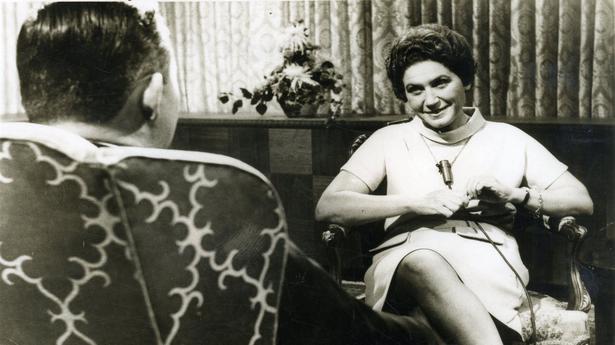
Sanctions on Putin’s daughters recall defection of Svetlana Stalin and burden of patronym
The Hindu
Putin's daughters have reportedly no intention to defect or denounce their father
On Wednesday, the United States government, in a renewed round of sanctions, extended them to the two daughters of Russian president Vladimir Putin - Katerina Tikhonova and Maria Vorontsova. Little is known of the two ladies, but the extension of sanctions to them and the end of the unipolar post-Cold War world order due to the Russian attack on Ukraine, has evoked memories of an incident involving another daughter of a Russian leader that took place during the height of the Cold War - the defection of Svetlana Alliluyeva, daughter of Josef Stalin, in March 1967 to the U.S., the defection taking place from New Delhi.
While Ms Tikhonova and Ms. Vorontsova's cases are different from that of Alliluyeva- neither of Mr. Putin's daughters have reportedly any intention to defect or denounce their father, who is still the supreme leader of Russia, while Stalin had by then been deceased for over a decade - the tangled history of the defection with India as the site of it still makes for an interesting story.
According to the biography of Alliluyeva (Svetlana had taken on the name of her mother's family) by Rosemary Sullivan, Stalin's Daughter - The Extraordinary and Tumultuous Life of Svetlana Alliluyeva", Stalin's daughter had had a hot and cold relationship with her father, losing many relatives to the frequent purges undertaken by him. After his death, she felt that she was being treated like a "national relic" or government property.
In the mid 1960s, she had met and fallen in love with Brajesh Singh, leader of the Communist Party of India, belonging to the royal family of Kalakankar near Prayagraj in Uttar Pradesh and nephew of then Minister in the Indian government Dinesh Singh. Though the two fell in love, the Soviet authorities refused Alliluyeva permission to marry him. They, however, lived together till Singh, in Moscow for treatment of a lung ailment, passed away in 1966. Her trip to India, was ostensibly to immerse his ashes in the Ganga as per Hindu rituals, and she was reluctantly given permission to visit the country. She had two children from a previous marriage who she left behind in Russia.
On March 6, 1967, three months into her trip and on the verge of her return to the Soviet Union, then 41-year-old Alliluyeva walked into the U.S. embassy in New Delhi as the Soviet mission was hosting a cocktail party. She had, the previous year itself, managed to smuggle out the manuscript of her memoirs, Twenty Letters to a Friend, via then Indian envoy in Moscow T.N. Kaul, and was carrying it with her.
Needless to say there was consternation in the U.S. embassy with this high-profile defector at their doorstep, with then Consul George Huey reportedly asking her, "So you say your father was Stalin? The Stalin?" It took a few hours to determine whether the U.S. wanted the international incident to occur with not just the Soviet Union but also the Indian government, which would be upset at having been caught in the midst of the Cold War tangle.
According to Ms. Sullivan's book, Danny Rayle, then second secretary in the U.S. embassy, took his own time to verify her identity and was amazed that she had managed to get her passport from the Soviet authorities who had assumed she would return to Moscow in a couple of days. In the midst of it, she recalled that she was due for a dinner party at Kaul's residence, she called Preeti Kaul, his daughter, to make her excuses. This was also a test put by the Americans to verify whether she was who she claimed she was.











